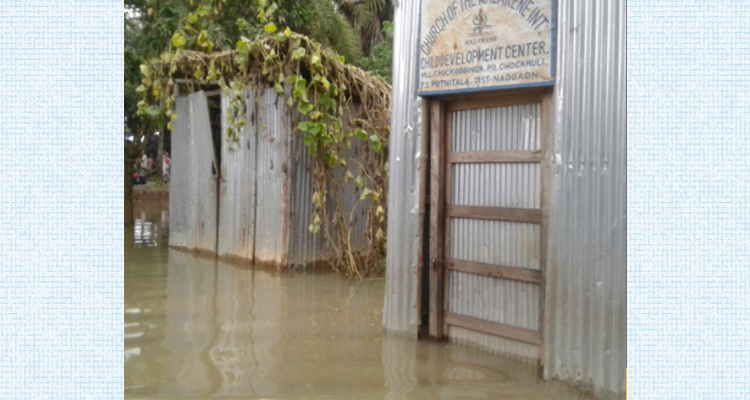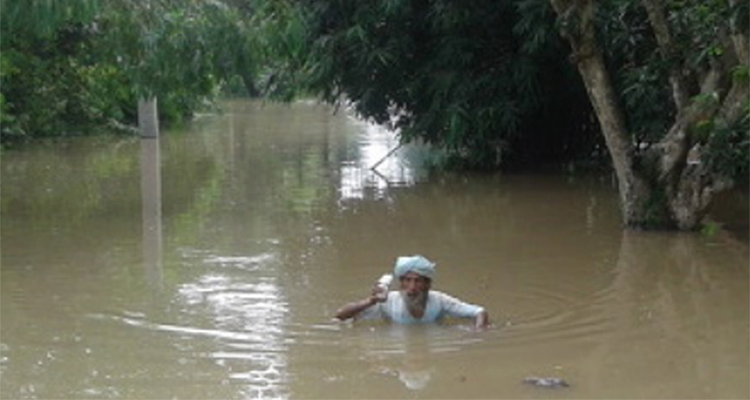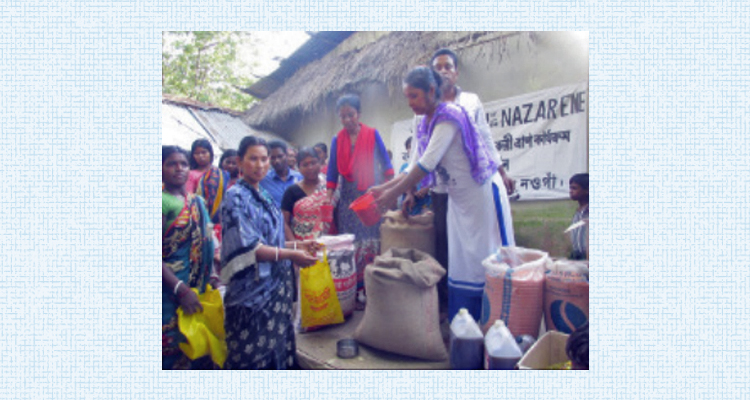Nazarenes in Bangladesh bring relief to submerged village after flood

Komali* is a Child Development Center coordinator in the North-West District in Bangladesh. After massive floods swept into Bangladesh in August, she wanted to visit one of her CDCs in an affected area. She found the whole village flooded; everywhere she looked there was water.
People and cattle were on the tin roofs. People had lost everything they owned: their belongings, their food, their clothes. Girls from her school begged her for clothes more than for food – although they had not eaten for days – because without clothing they were forced to hide behind tree leaves.
The area's greatest flood of this century was caused by high temperatures that created heavy rainfall in the Himalaya Mountains and melted the snow. This water rushed down the mountains, across India and Nepal, causing the rivers to overflow, flooding the land. Because Bangladesh is at the end of these rivers, all this water ran into Bangladesh.

Overnight, one-third of Bangladesh was flooded.
Estimates are that 41 million people were affected and as many as 1,500 killed. And that is only during the floods. Now that the water has receded, diseases like cholera, dengue fever, and malaria are major threats.
When Komali saw the families suffering, her heart broke. She gathered money from herself and fellow workers and went back the next day with helpers and a boat with food and clothes.
The boat floated over the tops of drowned banana trees, submerged rice fields, and tracks where roads and bridges should be. Leaves or trees that reached above the water level were filled with snakes, ants, and other small animals.
After four days of mostly standing at the higher-level road beside the village, the people received their first relief help.

Three weeks after the water receded, Komali takes me and my wife, Corry, to the village. We have been in Bangladesh with our nonprofit organization, Changing Lives, to provide training on how to use hygienic practices to prevent communicable diseases. The timing of our training seems ordained as the people will need every skill now, more than ever, to prevent diseases that may be spread and exacerbated by the slowly receding waters.
On our way to the village, we see damaged rice fields, destroyed mango trees, and devastated banana plants. The lower part of the brick wall houses is darker where they have been under water. But most of the houses in the village have mud walls, and for that reason they are ruined. The unpaved roads are muddy and slippery. And everywhere we are overpowered by the smell of rotting debris, urine, and feces.
We talk with Jacinthe*, a 35-year-old mother of two children, ages 10 and 4. Jacinthe is a field laborer; her husband has a disease, disabling him to work. She spent eight days living on the higher-level road until the water had receded enough to enter her house. While still waiting, she had received Komali’s help at day four, and later a relief package with food for a week. While living on the road they had no place to sleep, no food to eat for the first four days, no access to safe drinking water, and the water that surrounded them was their washroom.
The family owns a small (two by five meters), two-room house with mud walls, a mud floor, and a tin roof. During the floods, she lost everything she had: clothes, food, her bed, and 20 hens. Her house was severely damaged. She has done some repairs to her roof and walls with sheets of tin that she found in the floods. But Jacinthe is still in the need of more wood and tin for her house. Her most urgent needs now are building materials, clothes, and food.
Nazarene Compassionate Ministries has responded to the floods with food packages. Ten thousand packages containing rice, lentils, potatoes, oil, and soap are being distributed in the North and North-West District of Bangladesh. Depending on the size of the family, this package will last five to 14 days.
In communities surrounding local Nazarene churches, approximately 63,000 people were affected, including more than 7,800 church members from 948 local churches. NCM is also helping non-Nazarene families. Twice the amount of food packages are needed, so only the poorest of the poor receive help at this moment.
How to help
Pray
Please pray for those facing the sudden and unexpected loss of loved ones, for those who lost their homes and have nowhere to go, and for the protection of lives, especially from cholera and other illnesses. Also pray for the churches working to care for their neighbors and meet urgent needs.
Give
Churches and individuals around the world can provide support through the South Asia Flood Response fund. Donations will be used for immediate needs, including food and water purification tablets, as well as long-term rehabilitation and food security.
To send donations by mail:
In the U.S., make checks payable to "General Treasurer" and send them to:
Global Treasury Services
Church of the Nazarene
P.O. Box 843116
Kansas City, MO 64184-3116
Be sure to put 128210 in the Memo area.
In Canada, make checks payable to "Church of the Nazarene Canada" and send them to:
Church of the Nazarene Canada
20 Regan Road, Unit 9
Brampton, Ontario L7A 1C3
Be sure to put 128210 in the Memo area.
For additional countries, give through your local church or district, designating your gift to South Asia Flood Response.
Han and Corry Tan were in Bangladesh providing medical training on preventing communicable diseases such as cholera. From the Netherlands, the couple are Nazarenes who work in medicine and founded Changing Lives, which brings training to health workers, teachers, and others in South Asia about water, sanitation, hygiene, and dental care and prevention of diseases related to these.
*Names changed and location omitted for security
